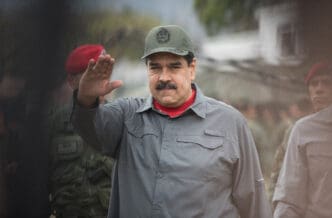Executive Summary
The Story So Far
Why This Matters
Who Thinks What?
President Donald Trump is weighing military action, including potential land strikes, to remove Venezuelan President Nicolas Maduro from power, a move experts warn could lead to a lengthy U.S. military commitment, widespread chaos, and a possible civil war. The contemplation of such action comes as the U.S. military has deployed significant assets to the region, although officials publicly state these are for counter-drug operations.
Potential for Instability and Long-Term Engagement
While President Trump has indicated that Maduro’s time in power is limited and has reportedly approved covert actions within Venezuela, experts suggest the U.S. currently lacks the military resources for a large-scale operation to oust him. A recent briefing reviewed updated options for military action, coinciding with the deployment of over a dozen warships and 15,000 troops to the region as part of “Operation Southern Spear.”
Administration officials have intensified pressure on Maduro, linking him to the Tren de Aragua gang and drug trafficking efforts. However, analysts caution that removing Maduro could exacerbate the country’s instability rather than resolve it. Juan Gonzalez, a resident fellow at the Georgetown Americas Institute, suggested that Maduro acts as a “moderate inside the Chavismo” movement, and his removal could pave the way for a more authoritarian leader or a military takeover.
John Bolton, Trump’s former national security adviser, echoed concerns about a military power grab. He stated that if the Venezuelan military remains cohesive, it would likely assert control and suppress public dissent following Maduro’s ouster, rather than collapse.
A Western diplomat, speaking anonymously, emphasized Maduro’s role as a “guarantor of the equilibrium” within Venezuela’s fractured political landscape, which includes competing civilian and military factions, Colombian insurgent groups, and criminal syndicates. The diplomat warned that Maduro’s disappearance could plunge the nation into civil war.
Challenges for the Opposition
The Trump administration has previously supported Venezuelan opposition figures, notably Juan Guaido in 2019, following an internationally decried 2018 election. However, a failed coup attempt highlighted the difficulties in transitioning power.
Currently, an opposition group led by Edmundo Gonzalez, who the U.S. recognizes as the rightful winner of last year’s election, has a “100-hour plan” for transition. However, experts like Juan Gonzalez believe such a plan is unfeasible without sustained U.S. support, potentially including ground forces, to ensure the opposition’s safety and ability to govern.
The challenges for any opposition leader are formidable, extending beyond Maduro himself to include the Venezuelan military, pro-government paramilitary groups known as colectivos, the National Liberation Army (ELN), and other criminal organizations. Providing the necessary support would entail reconstructing the army, unfreezing government funds, and training police forces.
A GOP congressional staffer noted that an extended U.S. military involvement in Latin America could face domestic political backlash, potentially undermining President Trump’s campaign promises to avoid costly overseas entanglements. However, Elliott Abrams, a former senior State Department official, warned that backing down now could be seen as a “lost opportunity” to assert U.S. influence in the hemisphere.
Geopolitical Entanglements
Experts also highlight the geopolitical complexities surrounding Venezuela. The Maduro regime receives support from Russia, China, and Cuba, raising concerns that U.S. strikes targeting Venezuelan assets could escalate into a broader conflict. While direct military intervention from these nations is unlikely, their continued support could blunt the impact of U.S. actions.
John Bolton recalled that in 2019, the opposition believed Cuban intelligence had undermined their coup attempt. Furthermore, Henry Ziemer, a regional expert at the Center for Strategic and International Studies, suggested that Maduro might preemptively strike U.S. interests in the region, such as Caribbean oil platforms, if he perceives his ouster as imminent.
Despite the military buildup, the Trump administration maintains its focus is on counter-drug operations. President Trump offered an ambiguous response when asked about the possibility of war with Venezuela, stating, “I doubt it. I don’t think so.”








